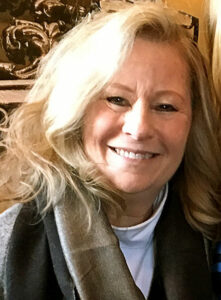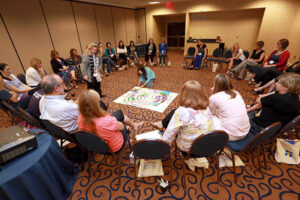Helping children work through grief with art

By Lauren B. Schiffman, Contributing Writer
Arlington – Decades ago, as a young mother, Laurie Moskowitz-Corrois, LMHC, REAT, was faced with a significant challenge. Her 10-year-old son suddenly became very ill with a diagnosis that sent them to children’s hospitals across the country for months at a time.
During those difficult months, she encouraged her son to communicate through art, which was “the only medicine I had to offer at that time,” she said. “Many images he created emerged from the page with startling intensity, reflecting much more than he had the words to share. It gave me actual proof of the limitless power and necessity of the creative process.”
This experience became the foundation for her understanding the value of expressive arts as a therapeutic process.
“Art became a way for me to support my son, acknowledge what he was feeling and help him externalize it,” Moskowitz-Corrois said. “Inherently therapeutic, the creative process has value in supporting us in accessing an authentic voice inside ourselves that’s not necessarily verbal.”
Prior to becoming a Registered Expressive Arts Therapist (REAT), Moskowitz-Corrois spent much of her adult life as an entrepreneur in the fields of art, design and business. She went back to school at age 53 and earned an Expressive Arts Therapy degree. Today, Moskowitz-Corrois is Associate Program Director – Family & Expressive Arts at The Children’s Room in Arlington, Mass., a bereavement center for families with children and teens who have experienced the death of a parent or sibling.

While many may think that therapy begins the healing process, Moskowitz-Corrois and her colleagues do not use the words “heal” or “recover.”
“Grief is a lifelong process. We continue to experience and integrate loss into our life as we move forward. Memories live on and become part of our story. The expressive arts – music, movement, poetry, image and storytelling – serve to support feelings and the making of meaningful memories,” Moskowitz-Corrois said.
In addition to her work at The Children’s Room, where she coordinates peer support groups for families; co-facilitates an arts-based “Family Night” program and volunteer trainings; and supervises student interns, Moskowitz-Corrois served as an adjunct at Lesley University, where she taught Principles in Art Therapy. She has also presented at the National Alliance for Grieving Children Symposiums and facilitates The Value of Therapeutic Space Planning, an annual workshop with Tufts University.
Moskowitz-Corrois applies her theory of “intentionality in the environment” at The Children’s Room.
“The Therapeutic Space Planning concept is based on an understanding of valuing and respecting the environment, being aware of the space’s purpose and supporting it to its full potential with intention. In turn, the space reflects back the feeling of purpose, care and the relationship it offers to those using and experiencing it,” she explained.
How does Moskowitz-Corrois measure the success of her work? She says that to go into the field of expressive art therapy, one must have actual proof of the power of creative self-expression.
“You need to experience it for yourself. The knowing is in the doing,” she said.
What’s next for this enthusiastic artist, creative thinker, therapist and entrepreneur?
“When you have the incredible opportunity go back to school to learn more later in life, to allow yourself to be curious and vulnerable, to challenge something new, to embark on a whole new career that brings your past and present together, moving forward…
I’m simply beginning and beginning again…it’s an exciting, youthful way to live,” she said.
For more information call 781- 641-4741, email info@childrensroom.org or visit childrensroom.org or the organization’s Facebook page.
Photos/submitted
![]()












